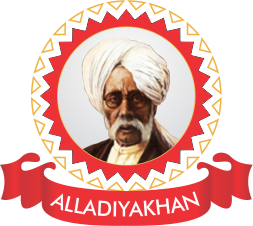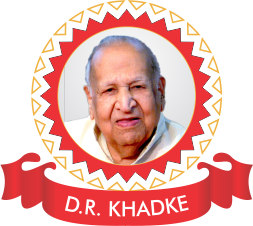
Sangeet Samrat Khansaheb Alladiyakhan was a pioneer of Jaipur Atrauli Gharana. Ustad Alladiyakhan Saheb was born on August 10, 1855, in Uniyara, near Jaipur, to Ahmed Khan, a well-known dhrupad vocalist and court singer in Uniyara. Although Ahmed Khan died when Alladiya Khan was only five, he received extensive taleem (instruction) from his uncle Jehangir Khan.
Alladiyakhan was also unique among musicians of his day in that he completed his studies in both Arabic and Persian. As a result of his uncle's all-around instruction and exposure to music, young Khan Saheb established himself as a successful concert singer in those days. He was frequently invited to sing at the royal courts of various princely states during that time period.
It is stated that the Raja of Amleta compelled ustad Alladiyakhan-saheb to sing for a week, morning and evening, without a break, which harmed Khan-saheb's voice. This episode most likely occurred in 1886, when Khan-saheb was approximately 31 years old. It required several years of careful riyaaz (practice) to restore his singing voice to normal. The enchantment of the young voice, however, was lost forever, prompting Alladiya Khan to consider a new approach to display his art.
The new form that emerged over the next few years included essentially no alap-pradhan, or slow-tempo dhrupad characteristics, but was prominently mixed with mid-tempo, complicated taan patterns and gamaks. These taan-patterns, oblique and spiral, taken at twice, three, or four times the basic pace of the composition, became the signature of his style and, eventually, of the 'Jaipur gharana', as it became generally known. It's also called the 'Jaipur-Atrauli gharana'.
He primarily drew on Gwalior and Agra traditions' dhrupad compositions to create khayal compositions. Jod-raags (a careful combination of two or more raag-matrices) and anavat (unheard) raag-matrices became his speciality. Nat-Kamod, Sampoorna-Malkauns, Basanti-Kedar, Bhoop-Nat, Savani-Kalyan, Malavi, and Basanti-Kanada are just a few of the raagas he sang and popularised.
Alladiya Khan saheb eventually relocated to Kolhapur, Maharashtra, to serve as the Raj-Gayak (court musician) for Maratha King Shahu Maharaj. This step boded well for both him and his gayaki. In this musically flourished land, he spread Jaipur gayaki far and wide, training numerous followers. The lineage of his students is nothing short of astounding.
His disciples notably include Pt Mallikarjun Mansur, Smt Kesarbai Kerkar, Gantapaswini Smt Mogubai Kurdikar, st. Azmat Hussein Khan (nephew), Ust. Haider Khan (Khan-saheb’s younger brother), Ust. Gulubhai Jasdanwala, Pt. Govindrao Tembe, Pt. Nivruttibuwa Sarnaik, Sardarbai Kardagekar, Pt. Gajananbuwa Joshi, Pt. Madhusudan Kanetkar, Pt. Govindrao Shaligram, Pt. Wamanrao Sadolikar, the late Pt. Anandbuwa Limaye, and Baba Azizuddin Khan.

Pandit Wamanrao Sadolikar was a renowned stage actor and classical singer of his day. He created many disciples including his daughter Smt Shruti Sadolikar - Katkar. It was a privilege of D.R.Khadke to have learnt music from Pt Wamanrao for 22 years during which pandit ji motivated Khadke kaka to take the lead in organising the music festival dedicated to Ustad Aladiyakhan saheb and the legacy continues till date.

Born in 1916 in Satara, he completed his schooling up to 10th. Later came to Mumbai for higher education and was meritorious enough to grab admission in the reputed St. Xavier's College, Mumbai and completed a B.Sc. in Mathematics. Simultaneously, he was preparing to join the Bombay Police Force during World War II and succeeded in entering the elite force and rose up the ranks to head leadership positions in Intelligence Burueau. Khadke kaka was well-known to handle complicated, treacherous and sensitive cases. This drew attention from the top most political leadership of the country and was offered a senior position in the premier foreign intelligence agency of India- the Research and Analysis Wing in 1952 where his career flourished. Later, for his high-magnitude contribution and meritorious services towards national security, he was awarded the President's Police Medal and Prime Minister's Medal.
He retired in 1974 and started learning Natya Sangeet from the renowned singer Pt Wamanrao Sadolikar for a year and later took Taleem in Hindustani Classical Music for 22 years. During his training, the idea of celebrating the anniversary of Sangeet Samrat Khan saheb Alladiyakhan struck him and Pt Wamanrao, immediately agreed to this idea.
In 1978, the first anniversary of Sangeet Samrat Alladiyakhan was celebrated for one day. In later years the program was gradually extended from one day to two, from two to three and today, stands at four days thereby the number of artistes participating has exceeded 30.
The Sangeet Samrat Alladiyakhan music festival was the brainchild of Late D. R. Khadke Kaka and was initiated to pay tribute to the doyen of Jaipur - Atrauli Gharana - Sangeet Samrat Alladiyakhan Saheb. The significant feature of this festival is diversity and inclusivity giving opportunities to artistes of all gharanas and hierarchies. Since its inception, the nature and stature of the festival has evolved to such an extent that it is the only festival of this magnitude where entry to music lovers remains FREE. The entire operations of the festival are managed by “D. R. Khadke Pratisthan”. The festival has also started with the concept of “D. R. Khadke Swaravrati Sanmaan Puraskar” to acknowledge the contributions of legends to the field of music by felicitating the recipient during the festival. This will serve as an instrument to rejuvenate the zeal of the music leaders in continuing their unparalleled contribution to music and motivating the upcoming generation to grab the knowledge and art in an undiluted form.
D. R. Khadke Pratisthan (A registered trust with Charity Commissioner, Mumbai Registration No. E-16925 dated 19.05.1997), established by Late D. R. Khadke, is the workhorse responsible for conducting the SSAK music festival since 1978 with the only objective for conservation and propagation of classical music which is a vital component of the cultural heritage of our country. The trust is involved in conducting various programs every week (Wednesday), month (first Sunday) and a grand music festival annually. The entries to all the above events remain FREE of cost.
The central idea is to have quality Indian classical music without barriers. The organisation aims to celebrate the anniversary of Sangeet Samrat Alladiyakhan and at the same time, preserve, promote and propagate the legacy of Indian Classical Music through public engagement and participation. The festival will continue to be OF the people, BY the people, FOR the people.